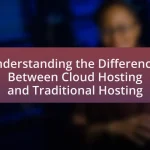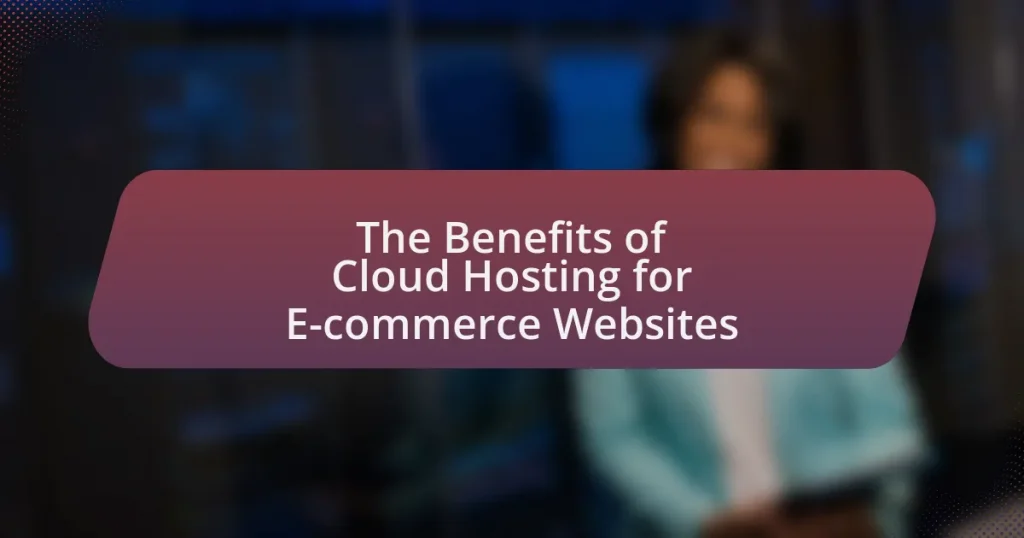Cloud hosting provides numerous advantages for e-commerce websites, including enhanced scalability, reliability, and cost-effectiveness. It allows businesses to efficiently manage fluctuating traffic demands, ensuring optimal performance during peak shopping periods while minimizing downtime through distributed resources. Additionally, cloud hosting reduces infrastructure costs, enabling e-commerce operations to pay only for the resources they use. The article explores how cloud hosting improves website performance, enhances security measures, and offers significant cost benefits, while also addressing potential challenges and best practices for transitioning to cloud solutions. Key considerations for selecting a cloud hosting provider are also discussed, emphasizing the importance of scalability, security, performance, and support in optimizing e-commerce operations.
What are the Benefits of Cloud Hosting for E-commerce Websites?
Cloud hosting offers significant benefits for e-commerce websites, primarily through enhanced scalability, reliability, and cost-effectiveness. Scalability allows e-commerce platforms to handle fluctuating traffic demands seamlessly, ensuring optimal performance during peak shopping seasons. Reliability is achieved through distributed resources across multiple servers, minimizing downtime and ensuring that online stores remain accessible to customers. Additionally, cloud hosting typically reduces infrastructure costs, as businesses only pay for the resources they use, making it a financially viable option for e-commerce operations. According to a report by Gartner, cloud services can reduce IT costs by up to 30%, further validating the economic advantages of this hosting solution for e-commerce websites.
How does cloud hosting enhance website performance for e-commerce?
Cloud hosting enhances website performance for e-commerce by providing scalable resources that can adapt to fluctuating traffic demands. This scalability ensures that during peak shopping periods, such as holidays or sales events, the website can handle increased visitor loads without slowing down or crashing. Additionally, cloud hosting utilizes multiple servers, which improves redundancy and reliability; if one server fails, others can take over, minimizing downtime. According to a study by Google, a one-second delay in page load time can lead to a 20% decrease in conversions, highlighting the importance of fast and reliable hosting for e-commerce success.
What factors contribute to improved performance in cloud hosting?
Improved performance in cloud hosting is primarily driven by scalability, resource allocation, and redundancy. Scalability allows cloud services to adjust resources dynamically based on demand, ensuring optimal performance during peak traffic times. Efficient resource allocation enables the distribution of workloads across multiple servers, reducing latency and enhancing speed. Redundancy, through multiple data centers and backup systems, ensures high availability and minimizes downtime, which is crucial for e-commerce operations. According to a study by Gartner, organizations that leverage cloud hosting can experience up to 30% faster load times, directly impacting user experience and conversion rates.
How does scalability in cloud hosting affect e-commerce operations?
Scalability in cloud hosting significantly enhances e-commerce operations by allowing businesses to adjust their resources based on demand fluctuations. This flexibility ensures that e-commerce platforms can handle varying traffic levels, especially during peak shopping seasons or promotional events, without compromising performance. For instance, a study by Gartner indicates that 70% of e-commerce businesses experience increased sales during holiday seasons, necessitating scalable solutions to manage the surge in visitors effectively. By leveraging cloud hosting, e-commerce sites can automatically scale up resources during high traffic periods and scale down during quieter times, optimizing costs and improving user experience.
Why is security a significant advantage of cloud hosting for e-commerce?
Security is a significant advantage of cloud hosting for e-commerce because it provides robust protection against data breaches and cyber threats. Cloud hosting providers implement advanced security measures, including encryption, firewalls, and regular security updates, to safeguard sensitive customer information such as payment details and personal data. For instance, according to a report by McAfee, 99% of cloud security breaches are due to human error, highlighting the importance of managed security services that cloud providers offer to mitigate these risks. Additionally, cloud hosting often includes features like automated backups and disaster recovery, ensuring that e-commerce businesses can quickly recover from potential security incidents.
What security features are typically included in cloud hosting services?
Cloud hosting services typically include security features such as data encryption, firewalls, intrusion detection systems, and regular security audits. Data encryption protects sensitive information both in transit and at rest, ensuring that unauthorized users cannot access it. Firewalls act as barriers between trusted internal networks and untrusted external networks, preventing unauthorized access. Intrusion detection systems monitor network traffic for suspicious activity, allowing for quick responses to potential threats. Regular security audits help identify vulnerabilities and ensure compliance with industry standards, enhancing overall security posture. These features collectively contribute to a robust security framework essential for e-commerce websites.
How does cloud hosting mitigate risks associated with data breaches?
Cloud hosting mitigates risks associated with data breaches by employing advanced security measures such as encryption, regular security updates, and robust access controls. These features ensure that sensitive data is protected both in transit and at rest, significantly reducing the likelihood of unauthorized access. For instance, many cloud service providers utilize end-to-end encryption, which scrambles data so that only authorized users can access it. Additionally, cloud hosting platforms often implement multi-factor authentication and continuous monitoring to detect and respond to potential threats in real-time, further enhancing security. According to a 2021 report by the Cloud Security Alliance, organizations using cloud services reported a 50% reduction in data breach incidents compared to those relying solely on on-premises solutions, highlighting the effectiveness of cloud hosting in safeguarding data.
What cost benefits does cloud hosting provide for e-commerce businesses?
Cloud hosting provides significant cost benefits for e-commerce businesses by reducing infrastructure expenses and offering scalable pricing models. E-commerce companies can avoid the high upfront costs associated with purchasing and maintaining physical servers, as cloud hosting operates on a pay-as-you-go basis. This model allows businesses to only pay for the resources they use, which can lead to substantial savings, especially during peak shopping seasons. Additionally, cloud hosting minimizes the need for in-house IT staff, as service providers manage maintenance and updates, further lowering operational costs. According to a report by Gartner, businesses can save up to 30% on IT costs by migrating to cloud solutions, highlighting the financial advantages of adopting cloud hosting for e-commerce operations.
How does cloud hosting reduce operational costs compared to traditional hosting?
Cloud hosting reduces operational costs compared to traditional hosting by eliminating the need for physical hardware and allowing businesses to pay only for the resources they use. Traditional hosting often requires significant upfront investments in servers and infrastructure, along with ongoing maintenance costs. In contrast, cloud hosting leverages a shared infrastructure, which spreads costs across multiple users, resulting in lower expenses. According to a study by Gartner, organizations can save up to 30% on IT costs by migrating to cloud services, highlighting the financial efficiency of cloud solutions over traditional models.
What pricing models are available in cloud hosting for e-commerce?
Cloud hosting for e-commerce offers several pricing models, including pay-as-you-go, subscription-based, and reserved instances. The pay-as-you-go model charges users based on actual resource consumption, allowing for flexibility and cost efficiency, particularly for businesses with fluctuating traffic. Subscription-based pricing involves a fixed monthly or annual fee for a set amount of resources, providing predictability in budgeting. Reserved instances require upfront payment for a specified term, often resulting in lower costs over time for businesses with stable resource needs. These models cater to different business requirements, enabling e-commerce platforms to optimize their hosting expenses effectively.
How does cloud hosting improve customer experience on e-commerce websites?
Cloud hosting improves customer experience on e-commerce websites by providing enhanced scalability, reliability, and speed. With cloud hosting, e-commerce platforms can easily adjust resources to handle varying traffic loads, ensuring that websites remain responsive during peak shopping times. For instance, a study by Gartner indicates that cloud services can reduce downtime by up to 50%, which directly impacts user satisfaction. Additionally, faster loading times, often achieved through content delivery networks integrated with cloud hosting, lead to lower bounce rates and higher conversion rates, as research from Akamai shows that a one-second delay in page load time can decrease customer satisfaction by 16%.
What role does uptime play in customer satisfaction for e-commerce?
Uptime is critical for customer satisfaction in e-commerce as it directly affects the availability of online stores. When e-commerce websites experience high uptime, customers can access products and complete transactions without interruption, leading to a positive shopping experience. Conversely, downtime can result in lost sales, frustrated customers, and damage to brand reputation. According to a study by Gartner, a single hour of downtime can cost e-commerce businesses up to $300,000, highlighting the financial impact of uptime on customer satisfaction. Therefore, maintaining high uptime is essential for fostering trust and loyalty among customers in the competitive e-commerce landscape.
How can cloud hosting facilitate faster load times for e-commerce sites?
Cloud hosting can facilitate faster load times for e-commerce sites by utilizing a distributed network of servers that can handle traffic spikes and optimize resource allocation. This architecture allows for load balancing, which ensures that no single server becomes overwhelmed, thereby reducing latency. Additionally, cloud hosting often employs Content Delivery Networks (CDNs) that cache content closer to users, further decreasing load times. According to a study by Akamai, a 100-millisecond delay in website load time can lead to a 7% reduction in conversions, highlighting the importance of speed in e-commerce.
What are the potential challenges of using cloud hosting for e-commerce?
The potential challenges of using cloud hosting for e-commerce include security risks, downtime, and compliance issues. Security risks arise from the shared nature of cloud environments, making e-commerce sites vulnerable to data breaches and cyberattacks; for instance, a 2020 report by IBM found that the average cost of a data breach was $3.86 million. Downtime can occur due to server failures or maintenance, which can lead to lost sales and customer dissatisfaction; according to a study by Gartner, even a minute of downtime can cost businesses thousands of dollars. Compliance issues may arise as e-commerce businesses must adhere to regulations like GDPR or PCI DSS, which can complicate cloud hosting arrangements and require additional resources to ensure compliance.
How can e-commerce businesses address concerns about vendor lock-in?
E-commerce businesses can address concerns about vendor lock-in by adopting multi-cloud strategies that allow them to utilize services from multiple providers. This approach enhances flexibility and reduces dependency on a single vendor, enabling businesses to switch providers or distribute workloads as needed. According to a report by Gartner, organizations that implement multi-cloud strategies can achieve up to 30% cost savings and improved resilience, demonstrating the effectiveness of this method in mitigating vendor lock-in risks.
What are the implications of data sovereignty in cloud hosting?
Data sovereignty in cloud hosting implies that data is subject to the laws and regulations of the country in which it is stored. This affects compliance, as businesses must ensure that their data handling practices align with local laws, such as the General Data Protection Regulation (GDPR) in the European Union, which mandates strict data protection measures. Additionally, data sovereignty can impact operational flexibility, as companies may face restrictions on data transfer across borders, potentially complicating global operations. Furthermore, it influences security protocols, as organizations must adopt measures that comply with local legal requirements, which can vary significantly from one jurisdiction to another.
How can e-commerce businesses effectively transition to cloud hosting?
E-commerce businesses can effectively transition to cloud hosting by conducting a thorough assessment of their current infrastructure and identifying specific needs for scalability, security, and performance. This assessment allows businesses to choose the right cloud service provider that aligns with their operational requirements, such as Amazon Web Services or Microsoft Azure, which offer robust solutions tailored for e-commerce.
Next, businesses should develop a detailed migration plan that includes data backup, application compatibility checks, and a timeline for the transition. This plan ensures minimal disruption to operations and customer experience during the migration process. Additionally, implementing a phased migration approach can help in managing risks and addressing any issues that arise in real-time.
Training staff on the new cloud systems and processes is also crucial, as it enhances operational efficiency and ensures that the team can leverage cloud features effectively. Finally, continuous monitoring and optimization of the cloud environment post-migration will help businesses maximize the benefits of cloud hosting, such as improved load times and enhanced security measures.
What steps should be taken to migrate an e-commerce site to the cloud?
To migrate an e-commerce site to the cloud, the following steps should be taken: assess the current infrastructure, choose a suitable cloud service provider, plan the migration strategy, back up all data, configure the cloud environment, migrate the data and applications, test the new setup, and finally, monitor and optimize performance.
Assessing the current infrastructure involves evaluating existing hardware, software, and network capabilities to identify what needs to be migrated. Choosing a suitable cloud service provider requires comparing options based on scalability, security, and cost-effectiveness. Planning the migration strategy includes determining whether to use a lift-and-shift approach or a more gradual transition.
Backing up all data is crucial to prevent loss during migration. Configuring the cloud environment entails setting up servers, databases, and security protocols. Migrating data and applications involves transferring files and ensuring compatibility with the cloud infrastructure. Testing the new setup is essential to identify any issues before going live. Finally, monitoring and optimizing performance ensures that the e-commerce site operates efficiently in the cloud environment.
What best practices should be followed during the transition process?
During the transition process to cloud hosting for e-commerce websites, best practices include thorough planning, data backup, and testing. Thorough planning involves assessing current infrastructure and defining clear objectives for the transition, ensuring alignment with business goals. Data backup is critical; it protects against data loss during migration, with a recommendation to create multiple backups in different formats. Testing the new cloud environment before full deployment is essential to identify potential issues, ensuring that all functionalities work as intended. These practices are supported by industry standards, which emphasize the importance of risk management and operational continuity during transitions.
What are the key considerations when choosing a cloud hosting provider for e-commerce?
When choosing a cloud hosting provider for e-commerce, key considerations include scalability, security, performance, and support. Scalability is crucial as e-commerce businesses often experience fluctuating traffic; a provider should offer resources that can be adjusted easily to meet demand. Security is vital to protect sensitive customer data; look for features like SSL certificates, firewalls, and compliance with standards such as PCI DSS. Performance impacts user experience and conversion rates; select a provider with high uptime guarantees and fast load times, ideally under 2 seconds. Lastly, reliable customer support is essential for resolving issues quickly; ensure the provider offers 24/7 support through multiple channels. These considerations are supported by industry reports indicating that 70% of e-commerce businesses prioritize security and performance when selecting a hosting provider.
How do service level agreements (SLAs) impact e-commerce hosting choices?
Service level agreements (SLAs) significantly influence e-commerce hosting choices by defining the expected performance, uptime, and support levels that a hosting provider commits to deliver. These agreements provide e-commerce businesses with clear benchmarks for reliability and service quality, which are critical for maintaining customer satisfaction and operational efficiency. For instance, a typical SLA may guarantee 99.9% uptime, meaning that the e-commerce site is expected to be operational almost all the time, thereby minimizing potential revenue loss due to downtime. Additionally, SLAs often outline response times for technical support, which can be crucial for resolving issues quickly and maintaining business continuity. By evaluating SLAs, e-commerce businesses can select hosting providers that align with their operational needs and risk tolerance, ensuring that they can meet customer expectations effectively.
What features should e-commerce businesses prioritize in a cloud hosting provider?
E-commerce businesses should prioritize scalability, security, performance, and support in a cloud hosting provider. Scalability ensures that the hosting can accommodate traffic spikes, which is crucial during peak shopping seasons; for instance, cloud solutions can automatically allocate resources as needed. Security features, such as SSL certificates and DDoS protection, are vital to protect sensitive customer data and maintain trust, with studies showing that 60% of small businesses that experience a cyber attack go out of business within six months. Performance, including fast load times and uptime guarantees, directly impacts user experience and conversion rates, as a one-second delay can reduce conversions by 7%. Finally, reliable customer support is essential for resolving issues quickly, with 24/7 availability being a standard expectation in the industry.
What tips can help e-commerce businesses maximize the benefits of cloud hosting?
E-commerce businesses can maximize the benefits of cloud hosting by implementing scalable infrastructure, ensuring robust security measures, and utilizing data analytics tools. Scalable infrastructure allows businesses to adjust resources based on traffic demands, which is crucial during peak shopping seasons; for instance, Amazon Web Services (AWS) offers auto-scaling features that automatically adjust capacity. Robust security measures, such as encryption and regular security audits, protect sensitive customer data, which is essential given that 43% of cyber attacks target small businesses. Finally, leveraging data analytics tools enables e-commerce businesses to gain insights into customer behavior and optimize their marketing strategies, leading to improved sales performance.










